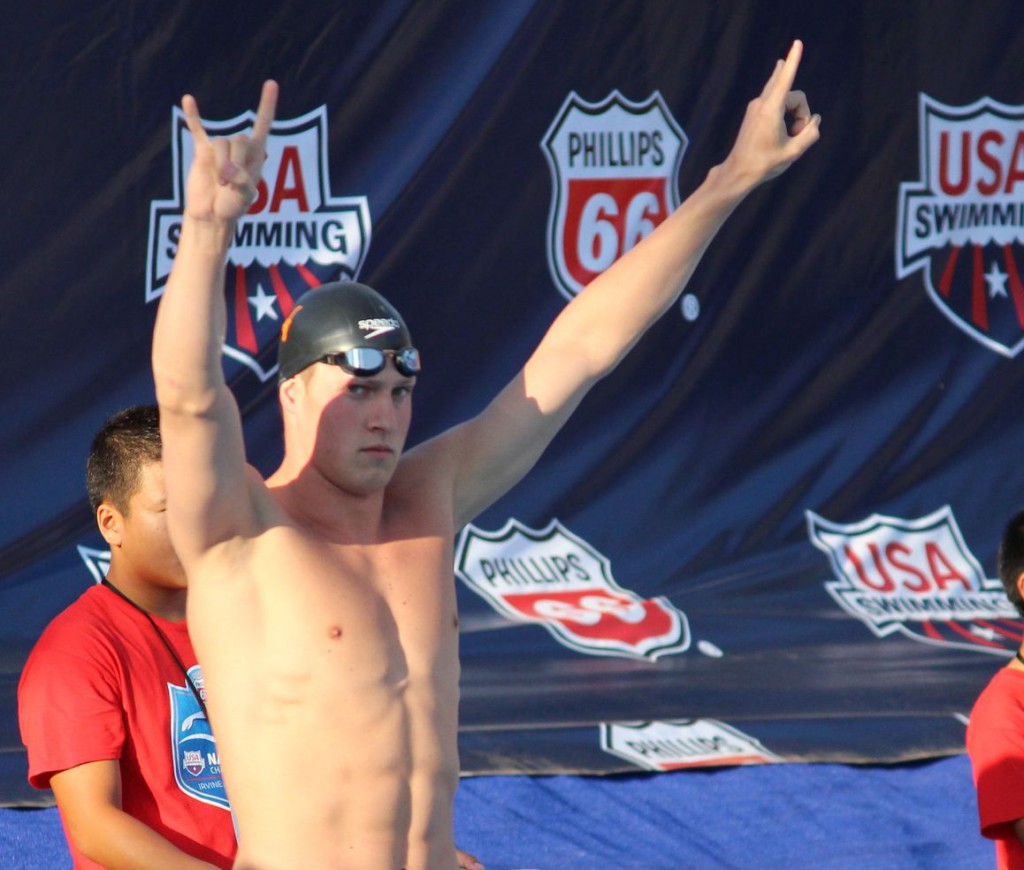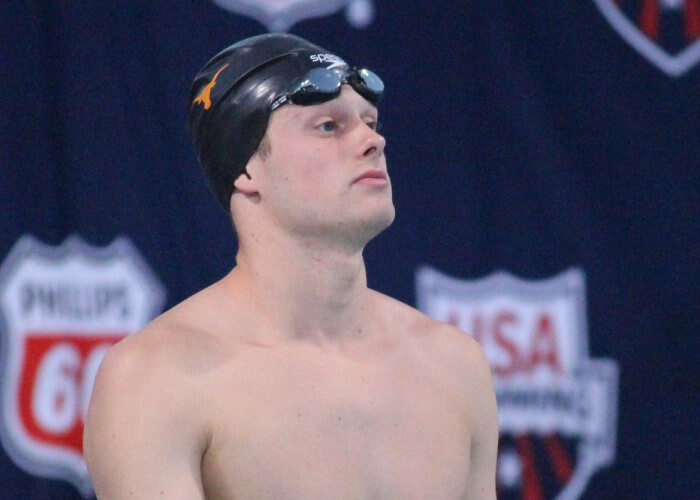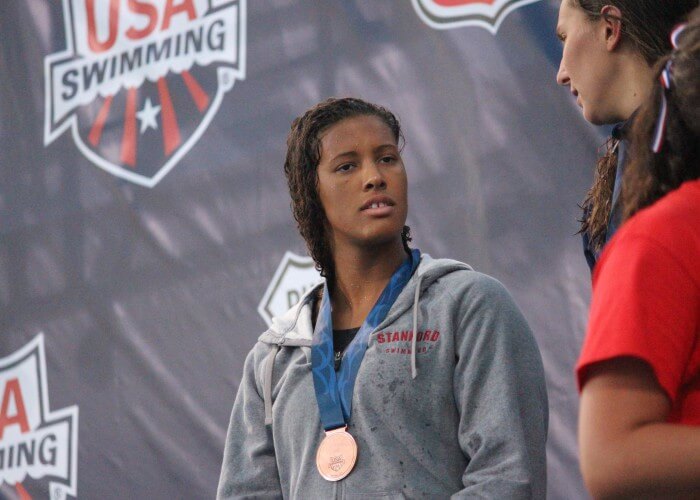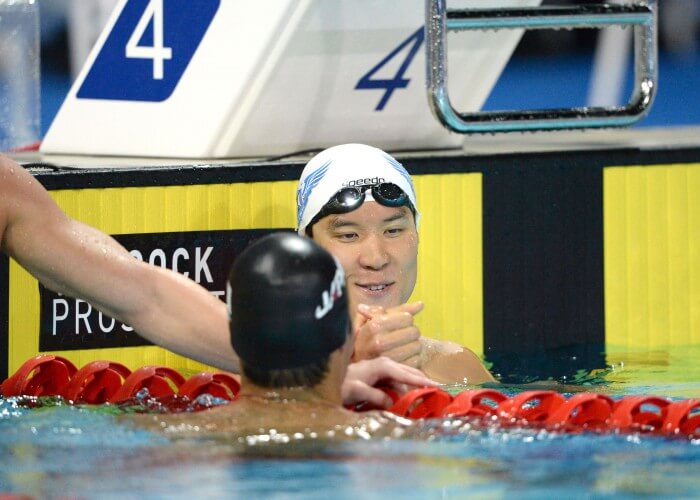College Swimming, Drug Tests Top the Talk In The Week That Was

TUCSON – College swimming, in the United States and Canada, took a lot of the headlines in the past few days, and as we count down the top five swimming headlines on The Week That Was, we’ll look further into news regarding an All-American’s absence and a CEO’s exit.
The Week That was is supported by AgonSwim.com
The Week That Was #5: Richard Quick to be to be inducted into Texas Sports Hall of Fame
Richard Quick’s history with swimming dates well back before his days as a legendary coach for the University of Texas and Stanford University. He was a fast high school swimmer in the Dallas-Fort Worth area and got his first coaching job at a high school in Houston before starting a long and prosperous career in college swimming at his alma mater, Southern Methodist University. His work throughout his career will be honored in April at the Texas Sports Hall of Fame induction ceremony. Quick, who passed away in 2009 from an inoperable brain tumor, will be the only swimming-related inductee and one of a precious few with swimming connections in the Hall of Fame.
The Week That Was #4: Pierre Lafontaine steps down as head of Canadian Interuniversity Sport
After less than two years in the position as the head of Canada’s version of the NCAA, Pierre Lafontaine is stepping down. Lafontaine took the job in 2013 after many years serving as the national team director for Swimming Canada. Lafontaine hasn’t made public what his next chapter will entail, but likely it will involve making sport better. Through his work with Swimming Canada for about eight years, the country gained much international prominence, including medals at the world championships and Olympics. He had also worked as head of swimming for the Australian Institute of Sport before returning to his native Canada. Lafontaine’s goal during his time with the CIS was to bring more collegiate athletes to the Olympic level, including swimming.
The Week That Was #3: CSCAA keeps Texas men’s swimming at No. 1
The race for the men’s Division I swimming and diving championship trophy continues to be an exciting one, with the College Swimming Coaches Association of America keeping the Texas Longhorns at the top of their dual-meet poll rankings. Texas had a tough meet against Georgia recently, winning by just 16 points. Georgia’s performances helped them move ahead of California in the polls to second position, while Cal, the reigning NCAA champions, fell to third. Though the poll doesn’t work to predict the rankings at the NCAA championships, it does give an indication of the way some of the teams are preparing. It should be noted that Michigan was ranked number one in the final poll of the 2013-2014 season, but placed fourth at the NCAA championships.
The Week That Was #2: Stanford’s Maddy Schaefer off team roster
As we enter the one-month countdown to the start of the conference championship phase of the American collegiate season, dual meets performances are starting to heat up. Teams are prepping to get more athletes qualified for the NCAA championships in an effort to win a team title or score a precious top-ten finish. Stanford’s women’s team will have a bit of a struggle in their attempt to get to the top of the podium in March, as it was revealed to Swimming World that Maddy Schaefer is no longer on the team. That puts a strain on Stanford’s freestyle relays, as Schaefer was a key component there, as well as individually in the 50 and 100 freestyles. Stanford is still in good shape in those relays, but will have to look a bit deeper into its roster to find a replacement for Schaefer. Stanford’s head coach Greg Meehan did not give a reason for Schaefer’s departure, and we have not yet heard from Schaefer regarding her exit from the team. Schaefer had swum well in November, posting the fifth-fastest time in the nation in the 50 free and also being a part of Stanford’s top-ranked 200 free relay and 400 free relay.
The Week That Was #1: Two more positive drug tests, from Tae Hwan Park and Joao Gomes
Two more shocking announcements regarding positive drug tests came to light in the past week, including one Olympic champion and another case involving a Brazilian swimmer. Tae Hwan Park of Korea failed a drug test that came from an injection he received last summer before the Asian Games. Apparently, a chiropractor gave him a shot that the doctor assured Park did not contain any illegal substances. But that turned out to be false, though no reports on the type of illegal substance has not come to light. There’s been no news regarding any punishment for Park’s positive drug test, and if it will affect his results from the Asian Games. Park and his management company are preparing to sue the doctor and clinic for the injection and subsequent positive drug test, and are likely to face FINA and the World Anti-Doping Agency very soon. This news is going public right at the end of Park’s trip to the United States to test his mettle against the elite squad at SwimMAC Carolina.
Also in drug-related news, Joao Gomes of Brazil tested positive for a diuretic at the short course world championships last month. Gomes helped Brazil qualify for the finals in the three medley relay events in Doha, swimming only in prelims. But he did make the championship final for the 50 breaststroke, placing eighth. The issue at hand is whether Brazil’s gold medals in the men’s 200 medley relay and 400 medley relay, as well as the gold in the mixed 200 medley relay, will be stripped if Gomes’ performances in Doha are deemed invalid due to the drug test. His prelim swims would be removed and Brazil disqualified officially in prelims. That would move France to first in the men’s 200 medley relay, the United States to gold in the 400 medley relay and Great Britain to gold in the mixed 200 medley relay. This is a big black eye for Brazil, which has had a positive drug test in swimming every year for nearly six years. Not a good thing as they prepare to host the 2016 Olympics.








